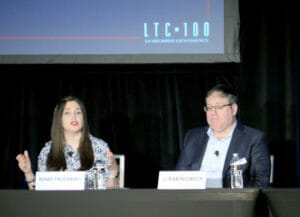

Investors making a long play will help buoy the skilled nursing industry as operators navigate mounting financial and regulatory pressures, and that’s just one reason a group of executives and analysts meeting in Florida this week are less concerned than one might think about the sector’s outlook for 2022.
Leaders from several large skilled nursing organizations took part in a panel at the LTC100 conference Monday morning, offering insights and opinions on a wide range of topics. Among them was whether skilled nursing would experience “substantial distress” over the next six to 12 months, which moderator and LTC100 Founder and President David Ellis defined as the sale or closure of at least 10% of facilities nationally.
Renee Pruzansky, CEO of ChoiceCare Management, said she expected sales to continue at a high pace but predicted closures would be limited. She said outside investors will continue to pour money into facilities — even those with high per-bed prices or in need of physical upgrades — because they know the baby boomers are coming. That may be especially true in rural areas where the local SNF is the only SNF, she said.
“People are smart. I know everyone out there thinks everyone who is buying is crazy. But I’m buying, and I don’t think I’m crazy yet,” she said. “You make an equation … When you look at all the variables and you know you have the experience that it takes to weather the storm and make the decisions you need to make to sustain them and be profitable in the future, sometimes you make that jump.”
While Zimmet Healthcare Services Group President and CEO Marc Zimmet declined to make broad generalizations about who’s buying and why, he is seeing some new interest on the sell side.
“For years, it was mom and pops. Now, we’re starting to see some of the smaller chains with 10, 12 facilities actually saying, ‘I’ll never get more money so let’s get out,’” Zimmet said. “I think the profile of the seller is changing.”
A changing marketplace
Others predict who’s buying will also continue to evolve, especially as private equity and real estate investment trusts come under increasing scrutiny.
JJ Rabinowich, executive director of the Ambassadors Group advocacy organization, said REITs “100% are already” pulling back from skilled nursing, an observation echoed by Cory Rutledge, managing principal of industry healthcare at CliftonLarsenAllen.
“REITs are an investment vehicle,” Rutledge said. “They’re going to go where they get better return on investment, and if they find there’s another sector of healthcare or another sector of real estate that makes that easier for them, that’s where they’re going to put their capital.”
Steven Littlehale, chief innovation officer at Zimmet, cautioned against demonizing REITs and other would-be investors, including those who may be considering skilled nursing for the first time. He said the REITS he’s worked with are pursuing strategies and paying to boost their operators’ capabilities.
“In terms of REITs and this euphemism of outsider money and inexperience of operators, it’s honestly just a way of assigning blame,” he said. “If we don’t have outside folks investing in our industry, if we don’t have inexperienced operators coming into our space and trying to figure it out, we just perpetuate what we’ve been doing in this industry for the last 20-30 years. … Our world has changed.”
Still, despite some positive takes on the flow of investment, the panel only gave the sector an average score 4.5 out of 10 when it came to an overall business outlook for 2022.
Fred Bentley, managing director of ATI Advisory, said much of the success will ride on the Centers for Medicare & Medicaid Services final implementation of a parity rate adjustment. The adjustment to the Patient Driven Payment Model could come all at once, or be phased in over time. Janine Finck-Boyle, vice president of regulatory affairs for LeadingAge, agreed, noting that the worst pain of the year would likely occur starting in OCtober with the beginning of the new federal fiscal year.
How heavily regulators lean into private rooms and other facility upgrades could also influence the fate of operators with buildings constructed in the 1960s and 1970s, Finck-Boyle added.
“Where are those dollars going to come from?” she asked.
Offsetting recession
Two-thirds of the panel predicted a recession would occur sometime in the second half of 2022.
While Ellis noted that skilled nursing often performs fairly well during a recession, he asked the panel to explore ways operators and owners might buffer themselves from expected changes in census or payment.
Most favored among them was improving retention and recruitment to ensure a stable workforce.
Others pushed involvement in ancillary services, I-SNPs or CMS’ new ACO REACH plan, an iteration of direct contracting that involves coordination with primary care physicians.
All could be ways to drive up revenue outside of Medicare Advantage, whose ever-increasing penetration Zimmet described as “absolutely suffocating” his clients.
Harvard health policy expert David Grabowski, Ph.D., said he thought provider-led I-SNPs were ready to explode in 2019, but that was followed by the pandemic. The 1135 waivers that allow more Medicare dollars to flow to skilled nursing probably artificially suppressed interest, Zimmet added, but panel members largely expected creation of new plans to quicken in coming months.
“This is a model we’re really good at,” said Erin Shvetzoff Hennessey, CEO of Minnesota-based Health Dimensions Group. “We’re really good at taking holistic care of our patients. We may not have the scale of these larger [insurance] organizations or the same time in the business as these larger organizations, but we have the most experience taking care of our seniors.”




